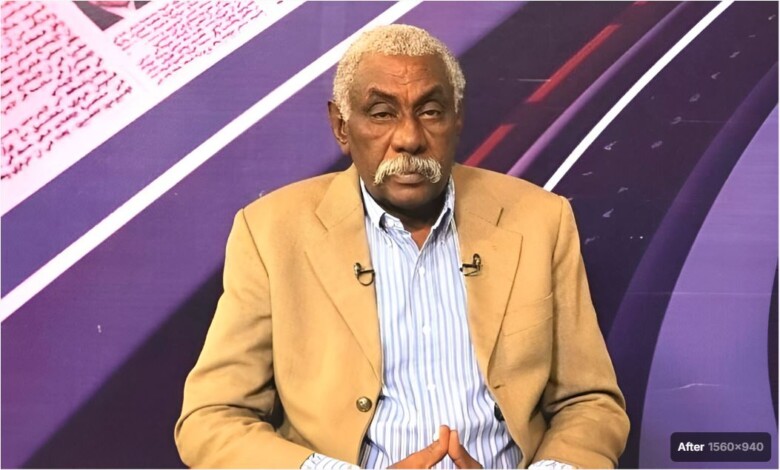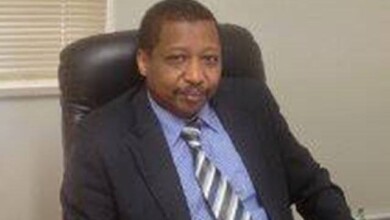Sudan at a Crossroads: The Islamist expansion and its implications for international peace and security?!

Al-Jameel Al-Fadil
Whilst observers were closely following the outcome of the Gulf-US summit hosted by Riyadh, the Sudanese issue suddenly emerged from behind the curtain of major conflicts, leaping to the forefront of regional and international security priorities.
Saudi Crown Prince Mohammed bin Salman’s statements, when he affirmed that “efforts to end the crisis in Sudan will resume through the Jeddah platform,” weren’t merely a diplomatic reiteration; rather, they were driven by worrying developments on the ground, foremost among them, is the rising influence of extremist Islamic groups, which have begun to cast a dark shadow over the future of the war and the paths to a solution.
Proceeding with Cautious Steps
The US Administration, which views with concern what its advisor, Masaad Boulos, described as “Sudan’s priority,” is proceeding cautiously towards addressing a crisis in which conflicting regional interests are intertwined.
Saudi sources revealed that the issue is no longer in the hands of the Ministry of Foreign Affairs, but has been transferred directly to the royal palace under direct US supervision, to avoid any complications that might hinder efforts to end the war.
Hindering the Brotherhood’s Influence
Al-Baraa Ibn Malik Brigades are among the most prominent armed Islamist groups to have emerged in the context of the current war.
The emergence of these brigades -which are linked to the Muslim Brotherhood Organization- and their support from regional powers such as Türkiye and Iran, through the dispatch of drone and ammunition shipments to the country.
This military support, which enhances the capabilities of these brigades and grants them increasing influence within the military establishment, naturally raises questions about the independence of the Sudanese Army’s decision-making as well as the influence of Islamist ideologies on its orientations.
Burning the Jihadists’ Bridges
Unfortunately, the expansion of Islamist influence in Sudan isn’t limited to its domestic context, but extends to the region and the world.
Sudan is a meeting point between North Africa, the Horn of Africa, and the Sahel region, making it a strategic location for jihadist groups.
A Hotbed of Terrorism
Reports have warned that Sudan could become a center for the recruitment and training of extremist groups, especially given the ties between some elements of the Sudanese Armed Forces (SAF) and the Muslim Brotherhood Organization, in addition to the emergence of militias with extremist Islamist leanings.
The statements uttered by the leaders of Al-Baraa Ibn Malik Brigades regarding their willingness to fight for Islamic causes outside Sudan, such as defending Palestine, portend the internationalization of the conflict and the transformation of Sudan itself into a base for jihadist operations in the region.
Removing Harm from the Paths
The expansion of Islamist influence poses an obstacle to peace efforts and democratic transformation in Sudan.
Several sources have indicated that the Islamists are seeking to prolong the war and obstruct any efforts to end it, with the aim of regaining their political influence and imposing their ideological agendas.
In addition, the participation of these groups in the war could lead to the emergence of new terrorist groups and drag the country into the swamps of ethnic and religious sectarian clashes that threaten Sudan’s unity and social cohesion.
Jeddah, Even if the Journey is Lengthy
During the Gulf-US summit in Riyadh, Saudi Crown Prince Mohammed bin Salman announced the Kingdom’s continued efforts to end the Sudanese crisis through the Jeddah platform, which is sponsored by the Kingdom of Saudi Arabia and the United States, with the aim of achieving a complete ceasefire in Sudan.
This statement reflects Saudi Arabia’s commitment to playing a pivotal role in mediating between the conflicting Sudanese parties.
The Supreme Council of the Gulf Cooperation Council (GCC) also commended the resumption of talks between representatives of the Sudanese Armed Forces and representatives of the Rapid Support Forces in Jeddah, with the aim of reaching a permanent cessation of hostilities and facilitating the delivery of humanitarian aid.
US Priority, Saudi Secrecy
Masaad Boulos, the US President’s Senior Advisor for the Middle East and North Africa, confirmed that the Trump Administration is exploring efforts to resolve the situation in Sudan, noting that the Sudanese issue is a priority and of great importance to the US Administration.
Saudi sources reported that the Sudanese file was transferred from the Ministry of Foreign Affairs to the Royal Palace, with the aim of finding ways to stop the war immediately, with unlimited US support and in complete secrecy, given the complexity of the Sudanese issue and the conflicting regional and international interests.
“Abu Dhabi” is the Final Touch
The US President Donald Trump is expected to discuss developments in the Sudanese crisis during his meeting in Abu Dhabi with Sheikh Mohammed bin Zayed, President of the UAE, especially in light of the conflicting regional and international interests.
This meeting could put the dots on the i’s and cross the t’s, thereby contributing to the coordination of regional and international efforts to support stability in Sudan, in a necessarily different form and concept.
Determination to Eliminate Risks
However, recent developments indicate a growing interest on the part of the four capitals —Washington, Riyadh, Doha, and Abu Dhabi— in finding a solution to the Sudanese crisis that mitigates the risks of the expanding influence of armed Islamist groups. This can be achieved through intensive international and regional coordination to confront this challenge and ensure a secure and stable future for Sudan and the entire region.





